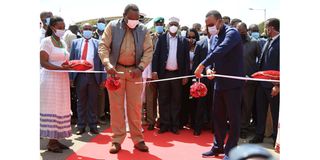Why Ethiopia, Kenya will benefit from enhanced economic activity in border areas

President Uhuru Kenyatta (left) and Ethiopian Prime Minister Abiy Ahmed cut the tape during the opening of Moyale One Stop Border post on December 9, 2020.
What you need to know:
- Prime Minister Abiy noted in his speech that the people of Ethiopia and Kenya are of one family but residing in two neighboring countries.
There are various regional projects put in place to complement and ensure comprehensive strengthening of economic integration between our countries.
For long, the pursuit of economic integration between Ethiopia and Kenya might have been regarded as a sterile policy discussion reserved to only academic discourse.
However, this view is void of two facts; our historical close relations ranging from sports diplomacy to strategic interests date back to the pre-colonial era, and the combined comparative advantage existent between the two countries provides more areas of cooperation and none for competition.
To highlight this, consider the recent visit by Ethiopian Prime Minister, Abiy Ahmed to Kenya. Amidst the ongoing developments, his visit signified Ethiopia’s continued relations and commitment towards completion of ongoing infrastructure developments and assurance that Kenya is our strategic partner of choice!
Indeed, Prime Minister Abiy noted in his speech that the people of Ethiopia and Kenya are of one family but residing in two neighboring countries. We are that close.
Economic wellness
In the past two years, the leaders of Ethiopia and Kenya have demonstrated that by committing to a shared common vision, economic wellness is feasible. Together, they have made great strides towards fostering trade and shifting reliance of people living across the boundaries from natural resources to other economic activities.
As a family, a vibrant integrated economy between our countries is crucial to transforming economies of the region, achieving sustained growth and prosperity for all countries in the region. This will further cement our sisterly-relations not only along the 861 kilometer long border between Ethiopia and Kenya, over a territory stretching from Lake Turkana to Mandera in Kenya, and from Borana to Liban in Ethiopia.
There are various regional projects put in place to complement and ensure comprehensive strengthening of economic integration between our countries.
The opening of the Moyale one stop border post this week and the planned roll out of hydro energy connection from Ethiopia to Kenya are a stark reminder that our leaders are committed to enhancing trade, development and growth.
When completed, all countries in the region stand to gain; but it is the people living across the borders who stand to reap out the most.
Opportunities arising from cross border trade will enhance resilience as well as expand supply chain networks far beyond the four counties of Marsabit, Turkana, Mandera and Wajir on the Kenya side, and the bordering regions in Ethiopia side.
Regional tourism will open new frontiers for both domestic and international visitors. Our rich heritage in history and athletic sectors will benefit as well. We may even host the first cross border marathon in Moyale. For any Kenyan national, travelling to any destination in Ethiopia is akin to you travelling from the city to your rural home, no visa required, for if anything, we are one family!
For Ethiopia and Kenya, fostering trade is mutually beneficial in two main ways; it will immensely complement the realisation of bilateral growth, and showcase the regional wide vision of our leaders in overcoming cross border challenges, especially the incidences of insecurity and conflict on either side of the border.
Economic cities
It is easier to connect the dots to see that the infrastructure developments being undertaken have laid the ground for regional economic cities to take shape.
This is underscored by the fact that for instance, the LAPSSET corridor infrastructure development project is owned by Ethiopia, South Sudan and Kenya. Our countries are squarely committed, we are at a juncture where the course of economic history will be re-written and changed for the better of our people.
As President Uhuru Kenyatta promised, after the road from Mombasa to Addis Ababa is complete, he will make his maiden voyage from Nairobi to Addis Ababa. It will be our delight to receive and host President Kenyatta in Addis Ababa as we celebrate either the Ethiopia’s New Year, on the first week of September, or during the Ethiopian Christmas in the first week of January.
To us as citizens, let us continue to support our leaders to ensure commitment to this course, the sacrifices we make today will go a long way to ensuring our children benefit in the years to come.
Ethiopia is committed towards ensuring that any infrastructure development undertaken in Ethiopia will bring prosperity to our sister Kenya. As Prime Minister Abiy said in Lamu, without infrastructure development and economic integration, we cannot survive the 21st century.




